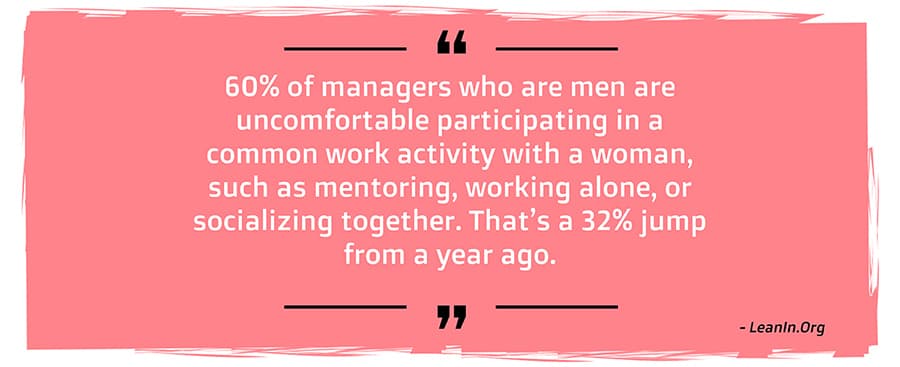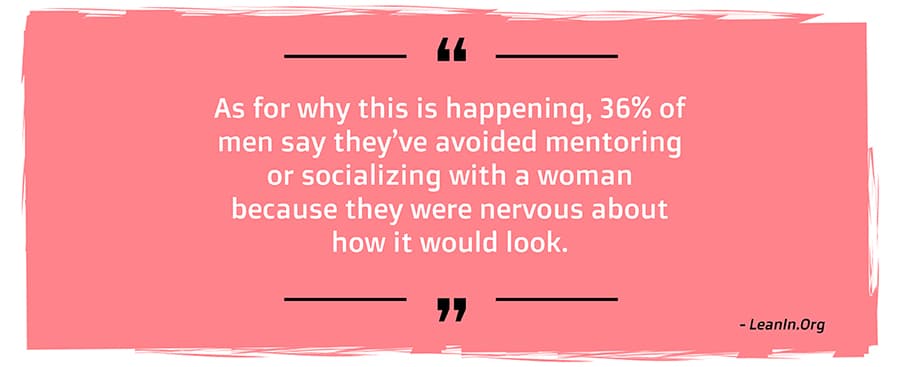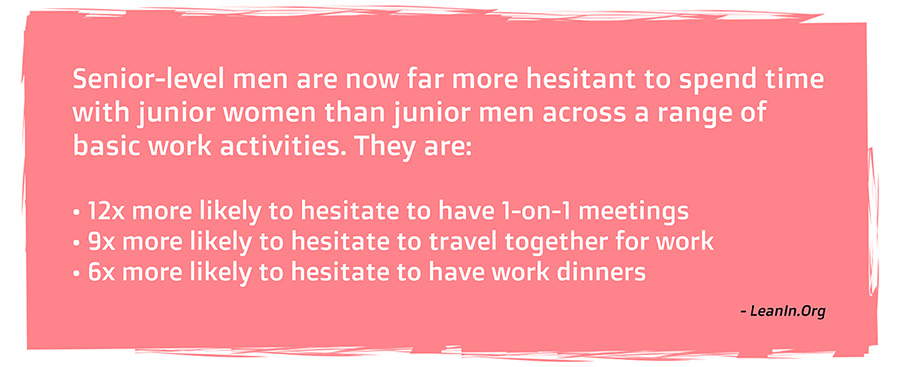- Survey: Men in workplace evading solo interactions with women
- Sixty percent of male managers are uncomfortable participating in common work activity with a woman, such as mentoring, working alone, or socializing together.
- Thirty-six percent of men say they’ve avoided mentoring or socializing with a woman because they were nervous about how it would look.
Some worry that #MeToo has caused way more harm than good. Men in the workplace are getting fired too quickly and without due process. Credibility assessment are heavily flawed and, in some cases, carry prejudice against men. A point often overlooked is that women are human beings, and sometimes human beings ‘lie.’
Heightened awareness surrounding false sexual misconduct allegations in post #MeToo Time’s Up movements have raised questions about what lies ahead of men and women in the workplace. A new survey finds that 60 percent of male managers say they’re uncomfortable participating in a common work activity with a woman, such as mentoring, working alone, or socializing together. That’s a 32% jump from a year ago.
Senior-level men are now “far more hesitant” to spend time with junior women than junior men across a range of basic work activities. They are 12 times more likely to hesitate to have one-on-one meetings, nine times more likely to hesitate to travel together for work and 6 times more likely to hesitate to have work dinners.
 LeanIn, an advocacy group to empower women to achieve their ambitions, partnered with SurveyMonkey to research what men and women are experiencing in the workplace in the post #MeToo era.
LeanIn, an advocacy group to empower women to achieve their ambitions, partnered with SurveyMonkey to research what men and women are experiencing in the workplace in the post #MeToo era.
A rarely discussed drawback of the #MeToo and Time’s Up movements is that the organizations who are afraid of getting sued are now more focused on what employees are allowed to do or say around opposite sex colleagues.
 As Kim Elsessar, Forbes contributor and ex-Wall Streeter, points out in her book Sex and the Office1: “Organizations are not only incentivized to eliminate harassment but also they’re motivated to go overboard to discourage any behavior that could be perceived as slightly annoying, even by the most sensitive employees. This is where problems arise. Well-meaning organizations are inadvertently strengthening the sex partition. The hypersensitivity towards sexual harassment is creating a barrier between men and women at work.”
As Kim Elsessar, Forbes contributor and ex-Wall Streeter, points out in her book Sex and the Office1: “Organizations are not only incentivized to eliminate harassment but also they’re motivated to go overboard to discourage any behavior that could be perceived as slightly annoying, even by the most sensitive employees. This is where problems arise. Well-meaning organizations are inadvertently strengthening the sex partition. The hypersensitivity towards sexual harassment is creating a barrier between men and women at work.”
 This sex partition involves more than fear of sexual harassment allegations in the workplace. Men fear that friendliness will be interpreted as a romantic interest, which is making matters worse.
This sex partition involves more than fear of sexual harassment allegations in the workplace. Men fear that friendliness will be interpreted as a romantic interest, which is making matters worse.
Regardless of how senior-level men may feel about working a woman, there is no excuse for not being a good leader and not offering equal access to mentorship to women in the workplace. Their avoidance will set back women in the workplace even more.
(Elsessar, Sex and the Office, 2015)
Whether you want to stay up-to-date on HR news, read in-depth insights on HR trends or find new ideas on strategy, innovation, and leadership, The HR Digest Magazine is here to suit your needs and help you stay more informed.





